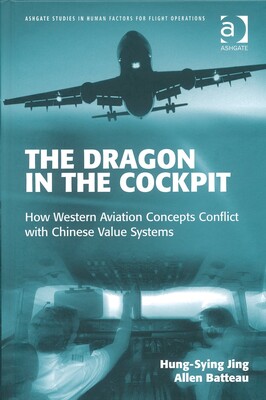The Dragon in the Cockpit-How Western Aviation Concepts Conflict with Chinese Value Systems

The Dragon in the Cockpit
How Western Aviation Concepts Conflict with Chinese Value Systems
Hung-Sying Jing, Professor
National Cheng Kung University, Tainan, Taiwan, R. O. China
Allen Batteau, Professor
Wayne State University, Michigan, U.S.A
Ashgate Publishing Limited, 2015, ISBN 978-1-4724-1030-6
Abstract
In The Dragon in the Cockpit, Jing and Batteau provide a new perspective on the differential successes of Chinese and Western civil aviation, in the contrasting cosmologies and value systems of China and the West. The Western cultures that invented the airplane and created global air transport networks are individualistic, egalitarian, and linear in their thinking. By contrast, Chinese culture is relationship-oriented, hierarchic, and figurative. These differences at times have tragic consequences. As currently designed, a modern airliner is a crew-served device, and flying it safely depends on a high degree of coordination among the flight crew. This is so important that an entire training discipline, “Crew Resource Management” teaches assertiveness, task-sharing and other communication skills to flight crews. Assertiveness, however, is a foreign concept in a hierarchic culture, and several accidents have resulted from junior officers failing to correct obvious errors by their seniors.
The situation becomes even more complicated with the addition of flight management systems to virtually all modern airliners. These systems are essentially computers that fly the airplane, and their programming embodies the logic of the Western engineers who designed them. The complexities created by European and North American airlines; when one adds the cultural and linguistic differences between East and West, the sources of misunderstanding skyrocket.
In The Dragon in the Cockpit, Jing and Batteau examine the most important differences between the Chinese and Western cultures and value systems in flight operation, especially since China is becoming one of the most prominent forces in commercial aviation. Can such vastly different perspectives be overcome by rigorous training, strong management, professionalism, and a strong cooperative culture? Jing and Batteau give you their insights in this magnificent book!
The book could not be more timely as aviation becomes increasingly international and with it the need for professionals to understand cultural forces and how they can affect aviation safety. Jing and Batteau provide superb insights into eastern and western cultural influences, and how Confucian perspectives differ from those of the West. This book would be a welcome addition to anyone with an interest in cultural differences, aviation safety, and human factors.
在中西差異很大的整體環境與價值體系的對比之下,針對中西雙方民航運作之間的特徵,景教授與Batteau教授在龍在座艙書中提供了一個全新的視角。西方文化是個人主義的,平等的,且線性式的思維。他們發明了飛機,創造了全球航空運輸網絡。相比之下,中國的文化是關係導向,階級的,和圖象式的。這些差異偶爾會造成悲劇性的後果。按照目前的設計,現代化的客機是組員協同操作,而安全飛行取決於機組人員之間的高度協調。對於飛行人員整個訓練紀律是非常重要的,其中“機組資源管理”訓練互相確認,工作分配及溝通技巧。然而,互相確認在一個講究階級的文化中是一個陌生的概念,而幾起事故起因於副機師沒有糾正他們前輩明顯的錯誤。
隨著現代客機自動化的飛行管理系統增加,情況變得更加複雜。這些自動化系統在本質上是計算機在飛飛機,其程式隱含西方工程師所設計的邏輯。基於這些歐洲和北美航空公司所建立的複雜環境,如果再加上中西之間的文化和語言的差異,則誤會的來源可能會飆升。
在本書中,景教授與Batteau教授細察中西雙方文化和價值體系在飛行運作中最重要的區別,尤其在中國正成為商業航空中最突出的力量之時。如此巨大的中西文化差異,航空界能夠透過嚴格的訓練,強健的管理,專業的精神,以及強大的合作要求去加以克服嗎?在本書獨到的視角中,景教授與Batteau教授提出了他們的真知灼見!
隨著航空變得更加國際化,需要各專業人士去了解文化的力量,以及它們如何影響航空安全,這本書提供了適時的訊息。景教授與Batteau教授為中西文化的差異,以及儒家的觀點是如何不同於西方,提供了卓越的見解。對於有興趣研究文化差異,航空安全和人為因素的專家學者,這本書將非常值得收藏。
